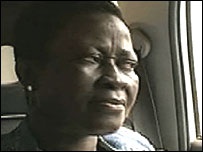
Ama Sumani, the Ghanaian woman who was deported despite undergoing treatment for terminal cancer, has died, friends said last night. The 39-year-old mother of two died on Wednesday afternoon in Korle Bu Hospital in Accra, Ghana. Friends had told her recently that £70,000 had been raised to get her the treatment and drugs that she so desperately needed.
Ms Sumani, a widow, had been treated for malignant myeloma at the University Hospital of Wales, in Cardiff, but was deported in January after her visa expired.
The Government’s decision to return her to Ghana provoked a public outcry amid claims that she could not receive life-saving treatment in her home country.
Her friends, who set up a campaign to try to secure her treatment in Britian, claimed that her return to Africa meant she would not have access to the thalidomide drug that she needed to treat the illness that was attacking her kidneys.
The medical journal The Lancet described the removal of Ms Sumani as atrocious barbarism.
“To stop treating patients in the knowledge that they are being sent home to die is an unacceptable breach of the duties of any health professional,” it said.
“The UK has committed an atrocious barbarism. It is time for doctors’ leaders to say so, forcefully and uncompromisingly.”
Lin Homer, the chief executive of the Border and Immigration Agency, later told MPs that although the case was heart-rending it was far from exceptional.
Ms Sumani had left the Welsh hospital in a wheelchair accompanied by five immigration officials before being driven to Heathrow to board a flight to Accra. It was reported that her condition took a turn for the worse after arriving in Ghana.
When she went to the capital’s hospital, they asked for $6,000 (£3,022) to cover three months’ treatment. British immigration officials who accompanied her to the hospital offered to pay for the first three months, but the offer was rejected because Ms Sumani had no source of funds to continue treatment after that period. In an interview given after her return, Ms Sumani spoke of how her misery was compounded by feelings of loneliness because she did not know anyone in Accra. She was from the north of the country, where her family remain. She was unable to travel there, but had she done so, the local hospital could not offer her the dialysis being paid for in Accra by wellwishers in Britain.
Asked about those who had contributed to her treatment, Ms Sumani said: “They helped me so much. All I can say is God bless them.”
Multiple myeloma is a cancer that affects plasma cells in the bone marrow. Up to 20,000 people are living with the condition at any one time in Britain. The average length of survival is about two years. Numerous organs are affected and the cancer produces a wide range of symptoms, from acute pain as the bones are destroyed by tumours to neurological problems and terminal kidney damage.
Ms Sumani came to England as a student in 2004. It is not believed that cancer had been diagnosed at that time. Her lack of English prevented her from taking up her course and she then sought work, which broke the rules of her student visa.
She did not keep in touch with the immigration authorities and was taken ill a year ago. Ms Sumani is survived by her children, Mary, 16, and Samede, 7.